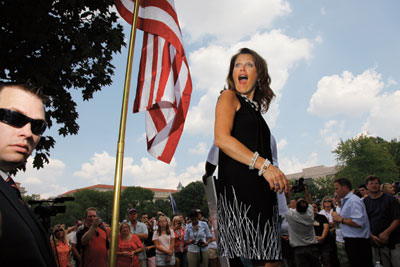
Illustration: Anita Kunz
There’s a story Michele Bachmann likes to tell when she speaks to religious audiences. It arrives about three-quarters through her stump speech, after the warning to opponents that she is “one tough cookie” and the crowd-pleasing pledge to make Barack Obama a—say it together—”One. Term. President.”
As Bachmann tells it, America’s national sovereignty is slipping away, and the sanctity of the family is being overrun by an encroaching nanny state. But we can find hope in the story of the Israelites, who, after drifting from their faith and coming under siege in their own land, shunned their false idolatry and pushed back the invaders with God’s help: “The men of Issachar understood the times that they lived in, and they knew what to do,” she says, referring to one of the 12 tribes of Israel. “They had the courage to carry it out.” Although Bachmann doesn’t note this, it’s the only episode in the Bible in which men are led into battle by a woman, Deborah.
This is Michele Bachmann’s message, in its biblical essence: America will be restored to its founding glory by a righteous few, and it’s going to take a fight. “It is my opinion that God has not given up on the United States of America,” she says, the crowd beginning to feel it, “and we shouldn’t either.”
Since her election to Congress in 2006, Bachmann has earned a reputation as one of the lower chamber’s biggest bomb throwers. She has accused the president of harboring “anti-American” views, warned that census data could be used to round up dissenters into internment camps, and declared that the Treasury Department is quietly planning on replacing the dollar with a global currency. To her critics, Bachmann is flat-out crazy, a purveyor of, as Rep. Keith Ellison (D-Minn.) put it, “psycho talk.”
But beneath language that seems cribbed straight from Glenn Beck’s magical chalkboard, there is a method to the congresswoman’s madness. Her rise was not a fluke, and she is not, as Fox News’ Chris Wallace clumsily implied in June, a “flake.” Bachmann’s candidacy represents the crest of a movement, four decades in the making, to restore faith as the foundation of public life in America—from public schools on up to the White House.
From her days as an abortion protester and conservative foot soldier, she has climbed the ranks, at every step of the way reshaping the political dynamic around her to reflect her own frenzied style. In some respects, her career arc mirrors the president’s—a restless youth, a life-changing trip abroad, a stint as a community organizer, and then a rapid rise from the state legislature to the US Capitol. Now she wants Obama’s job.
In June, when Bachmann officially kicked off her presidential campaign in Waterloo, Iowa, the town where she was born and lived until she was 12, she recast herself as a Hawkeye in exile. “Everything I need to know,” she told the crowd, “I learned in Iowa.” But her formative years were really spent four hours north in Anoka, Minnesota, where she moved with her parents shortly before they divorced.
 In August 2010, Bachmann threw a tea party event after Glenn Beck’s Restoring Honor rally in Washington, DC. Mark Peterson/ReduxIt was here, at 16, that she had the religious epiphany that has guided her life. Prodded by friends, she showed up at a prayer meeting one day, still in her cheerleading uniform. “I didn’t drink, I didn’t party, I wasn’t out chasing around,” she tells supporters now, “but I was still a sinner. Even though I didn’t have the big outward sins, I was still a sinner. I asked him to cleanse me and change me and turn me into his likeness.” The summer after she graduated high school, she went to Israel to work on a kibbutz. The trip was a revelation for Bachmann, who, citing Genesis 12:3 (“I will bless those who bless you, and him who curses you I will curse”), calls American prosperity God’s reward for the nation’s steadfast support for Israel.
In August 2010, Bachmann threw a tea party event after Glenn Beck’s Restoring Honor rally in Washington, DC. Mark Peterson/ReduxIt was here, at 16, that she had the religious epiphany that has guided her life. Prodded by friends, she showed up at a prayer meeting one day, still in her cheerleading uniform. “I didn’t drink, I didn’t party, I wasn’t out chasing around,” she tells supporters now, “but I was still a sinner. Even though I didn’t have the big outward sins, I was still a sinner. I asked him to cleanse me and change me and turn me into his likeness.” The summer after she graduated high school, she went to Israel to work on a kibbutz. The trip was a revelation for Bachmann, who, citing Genesis 12:3 (“I will bless those who bless you, and him who curses you I will curse”), calls American prosperity God’s reward for the nation’s steadfast support for Israel.
After a stint living with an uncle in Alaska, Bachmann enrolled at Minnesota’s Winona State University, where she met her husband, Marcus, through a campus Christian fellowship. Their courtship was not the stuff of rom-coms. One day, Michele was praying with a girlfriend when she had a vision of getting married to Marcus at his family farm in western Wisconsin. “I thought to myself, ‘Ooh, I don’t even like this guy. What’s this about?'” she explained later. But God provided the spark.
Together, they discovered politics. Michele and Marcus volunteered for Jimmy Carter’s presidential campaign in 1976, drawn in by the former Georgia governor’s born-again faith and their own roots. (Bachmann was raised in a Democratic family; she jokes that her party affiliation was printed on her birth certificate.)
Her political conversion came in college, while reading Gore Vidal’s Burr. She grew upset at the book’s mocking tone toward the Founding Fathers. “I looked out the window, and I said, ‘You know what? I think I must be a Republican,'” she recalled during a speech last December.
But the intellectual roots of her transformation go much deeper. Bachmann’s worldview is infused with a sense of urgency driven by her religious beliefs—particularly the conviction that current events are helping to usher in the apocalypse. “We are in the last days,” she said in 2006. “The harvest is at hand.”
At Winona State in the ’70s, the Bachmanns watched How Should We Then Live?, a 10-part historical miniseries written and narrated by Francis Schaeffer, a founding father of the religious right. The film would become central to the couple’s outlook.
Schaeffer’s goal was to reinject Christianity into the public sphere. The premise of his film was that modern society was dissolving in a morass of apathy, sin, and moral relativism. But there was a solution. As Schaeffer told it, Rome’s decline was the inevitable consequence of an insufficient moral foundation. Without a light to guide them, its citizens became apathetic. They stopped working and relied on assistance from the ever swelling government. Rome didn’t fall; it gave up.
For Bachmann, Schaeffer’s series offered a frame for understanding modern times—and more importantly, it illuminated the righteous pathway forward. She enrolled in law school at ultraconservative Oral Roberts University in Oklahoma, where, in Bachmann’s words, “they taught the law from a biblical worldview.” Over her own initial objections, she felt a divine calling—strongly encouraged by Marcus—to study tax law. “Tax law? I hate taxes,” she recalled in a 2006 address at a mega-church in Brooklyn Park, Minnesota. “Why should I go and do something like that? But the Lord says, ‘Be submissive.'” It’s a reference to Ephesians 5:24, which instructs women to obey their spouses: “As the church is subject to Christ, so let wives also be subject in everything to their husbands.” The Lord and Marcus knew best.
If tax law sounded less than thrilling, it was nonetheless a starting point. As Schaeffer had taught, Christians, whatever their professions, had an obligation to engage society and use their status to correct its wayward course. Bachmann was about to do just that.
In 1993, after giving birth to the fourth of five children, Bachmann quit her job as an attorney for the Internal Revenue Service, where she’d worked since completing her legal education. But she continued to follow the path she believed God had chosen for her. She and her husband went to abortion clinics, where they ministered to women on the sidewalks outside, and began taking in foster kids—23 of them over a period of eight years. She also got involved with New Heights, a charter school that was just opening its doors in Stillwater, a quaint Minnesota town on the banks of the St. Croix River where the Bachmanns had settled. Bachmann enrolled one of her kids and joined the school’s board.
The school’s founder and CEO, an evangelical prison minister named Dennis Meyer, insisted on adhering to the “20 key principles of Christian management,” according to minutes of the school’s board meetings, and encouraged board members to choose their actions “not because we ‘think’ it should be done a certain way, but because God wants us to.” This didn’t sit well with everyone. The minutes reveal deep fissures over the role of faith in the school’s mission.
If Meyer pushed the envelope, Bachmann took things further. According to Bob Beltrame, whose kids attended New Heights and who joined with other parents to oppose the efforts of the Meyer-Bachmann wing, Bachmann and an ally began attending classes and questioning the appropriateness of certain topics and materials. (Disney’s Aladdin was banned for promoting the occult.)
Most bothersome to Beltrame, a geologist, was Bachmann’s support for teaching creationism. “I told her, ‘Everybody can have their own beliefs, but it doesn’t belong in the classroom,'” he says.
With parents and board members clashing, a meeting was held to clear the air. Bachmann’s critics alleged that she had circumvented the board by sending parents a survey she’d created, asking them to report back. Things reached a climax when a teacher seized the floor. “He said, ‘There is evil in this room. We have to chase the evil out of this room,'” Beltrame recalls—at which point Bachmann and her allies joined in prayer to ward off the evil spirits. (It failed; Bachmann stepped down from her post shortly thereafter.)
Bachmann’s first political battle had been a disaster, but she reemerged five years later as a full-fledged education activist. The impetus was a state curriculum standard, implemented under Republican Gov. Arne Carlson, called the Profile of Learning, which put Minnesota into compliance with federal legislation. Policy wonks and teachers’ unions quibbled over certain aspects of the standards. But social conservatives reviled them for another reason: They saw the standards as an unconstitutional expansion of government control—an attempt, as Bachmann put it, at “politically correct indoctrination.”
Working closely with a nonprofit called the Maple River Education Coalition, Bachmann argued that the federal government was using its pot of education funding as a billion-dollar carrot to turn public schools into assembly lines for a state-planned economy, akin to that of the Soviet Union. One theory floated by the coalition held that Washington bureaucrats wanted to eliminate national borders entirely. There was a thinly veiled religious subtext: Among many evangelical Christians, globalism is a tool of the devil—a view popularized by the best-selling Left Behind novels, in which the Antichrist comes to power via the United Nations.
Carlson’s successor, Jesse Ventura, dismissed Profile opponents as conspiracy theorists, but Bachmann took the fight to a different audience. Armed with an overhead projector, Bachmann crisscrossed Minnesota to sound the alarm, speaking in church basements and pizza parlors. To her audiences, she went by “Dr. Bachmann,” although she had never received nor studied for a Ph.D. A policy analyst named Michael Chapman was supposed to be the main attraction, but it was Bachmann who usually whipped the crowd into a camp-meeting frenzy and brought shouts of “amen!” from the back of the room.
She became a rock star within her circle of activists and in 1999 began to look for more ways to get involved. Until that point, Stillwater had been largely immune to the culture wars, but Bachmann’s decision to run for school board changed that. It was a move directly out of the playbook of Christian Coalition wunderkind Ralph Reed, who once explained, “I would rather have a thousand school board members than one president and no school board members.” Bachmann and four allies secured the endorsement of the local Republican party—unheard of for a school board race—and ran on a single repeal-the-Profile slate. Things got ugly. At one debate, Bachmann falsely accused an opponent of being endorsed by Planned Parenthood.
Ultimately, the unified ticket flopped. But it was a start. The next year, Bachmann challenged the district’s moderate state senator, Gary Laidig. She showed up at the district GOP convention and, with the floor packed with anti-Profile activists, knocked off the incumbent on the first ballot. Bachmann presented herself as an unlikely victor, dressed in moccasins and an old sweatshirt, but it had the hallmarks of an old-fashioned putsch. Bachmann the politician had arrived.
In St. Paul, Bachmann quickly carved out a reputation as a different kind of legislator, one largely uninterested in the legislative process. Rather than adjust to the incremental, often tedious process of policymaking, Bachmann had begun to play the role she’d eventually embrace in Washington—remaining for, of, and by the grassroots, while slowly reshaping the debate on her terms.
Bachmann’s unwillingness to go through the motions became apparent in her first few weeks on the job. When fellow Republican state Sen. Sheila Kiscaden invited her and three other freshman legislators to participate in informal orientation sessions, Bachmann—who had used her unfamiliarity with St. Paul as a selling point on the campaign trail—wanted no part. She served on committees with conflicting meeting times and swung by just long enough to check her name off the attendance sheet, according to several former colleagues. This so frustrated fellow lawmakers that they considered switching to roll-call votes to highlight her truancy.
Her legislative record was bereft of any landmark achievements. “A lot of sizzle, no steak,” Kiscaden says. Bachmann crafted a law to encourage the teaching of select founding documents like the Mayflower Compact and the Declaration of Independence in public schools; she promoted a Taxpayer Bill of Rights but turned down a chance to put it up for a vote; and in one session, she introduced nearly a tenth of the chamber’s honorary resolutions (congratulating Stillwater Cub Scouts and calling for various statewide days of prayer, among other things).
Her fixation on niche issues, and propensity for framing rivals’ proposals in Orwellian terms, didn’t go unnoticed. Wy Spano, a University of Minnesota-Duluth instructor and longtime observer of Statehouse intrigue, notes that one of Bachmann’s early crusades in the Senate was a campaign against a state university system job-training program she believed was turning Minnesota into a fascist state by marrying government and business. That was too much for one Democratic state senator, who during a committee hearing put his hand over his microphone to ask Bachmann, “Do you believe this shit?” The crusade flopped.
Still, Bachmann emerged as the leader of a conservative insurrection within the ranks of the GOP caucus, using her office as a staging ground for what became a decadelong purge of moderates. “She was overheard on the floor of the Senate talking to another conservative about who the moderates were in the Republican caucus,” Kiscaden says. “And then she started pointing at different senators and said, ‘We’re going to get rid of him; we’re going to get rid of her; we’re going to get rid of him.'”
And they did: Kiscaden was forced out of the party shortly thereafter; so was fellow moderate Martha Robertson. Party loyalists who ended up on Bachmann’s bad side found themselves threatened with primary challenges, including state Sen. Paul Koering. And she played hardball. Eric Black, a political columnist for MinnPost, recounted the story of Bachmann, at a local GOP convention in 2006, threatening a woman who had opposed her nomination. Bachmann, he wrote, angrily repeated “you will pay” until the woman broke down in tears.
There was one issue that seemed to consume Bachmann. The slow creep of the gay rights movement was, in her words, an “earthquake issue,” with the potential to shake the foundation of society itself: the family. Taking a page from Schaeffer, who vilified the “rampant sexuality” and moral relativism of the Romans, Bachmann saw the gay rights movement as a secular ideology that posed a direct challenge to traditional marriages.
As she’d done before with the Profile of Learning, Bachmann embraced her role as a messenger. When EdWatch, as the Maple River Education Coalition was later known, invited her to deliver a speech at its 2004 convention, she unleashed a masterful presentation, mixing slides with self-deprecating humor, that hammered home the same urgent message that has since become familiar to a national audience: The forces working against you are bigger than you think.
Bachmann ripped into pop culture, telling her audience about a dangerous show she’d discovered called Sex and the City. (“It’s received critical acclaim,” she said, “so that tells you, ‘Don’t watch it.'”) She warned that The Lion King soundtrack was potentially toxic to small children because it was written by Elton John, a gay man. She urged her audience to pray for Melissa Etheridge, suggesting that the lesbian songwriter’s breast cancer diagnosis might be a wake-up call for her to turn away from her sinful lifestyle. To Bachmann, homosexuals had even usurped the English language. “It’s part of Satan, I think, to say that this is ‘gay,'” she said. “It’s anything but gay.”
The Bachmanns worked as a tag team. In 2005, they both participated in the Minnesota Pastors’ Summit, a conference sponsored by the Minnesota Family Council that was designed to train religious leaders for the culture wars. Michele led a session on a state gay marriage amendment; Marcus, in a rare moment of public activism, moderated a talk called “The Truth of the Homosexual Lifestyle.”
Marcus delivered a 45-minute presentation that used his role as a psychologist as a basis for a range of assertions about gays. He claimed, for instance, that more than 70 percent of gay men had been abused, which ultimately led them to “the lifestyle.” Then he turned the stage over to a “former lesbian” and family friend named Janet Boynes, who explained how she became straight through the power of prayer.
Boynes was a ubiquitous figure in Michele Bachmann’s early career. She sat in on Bachmann’s constituent meetings, attended campaign rallies, and was frequently seen at her side in the tunnels underneath the Minnesota Capitol. Marcus Bachmann’s clinic hawks Boynes’ book, Called Out, in its lobby, with a note from Marcus saying that it gives “insights of truth to set people free.” Michele’s endorsement appears on Boynes’ website. (Boynes declined to comment for this story, deferring questions to Bachmann’s office. Michele and Marcus Bachmann also declined to be interviewed.)
For the Bachmanns, defeating homosexuality isn’t just a moral imperative; it’s a business. On the stump, Bachmann sometimes talks about the Christian counseling clinic she and Marcus founded in Lake Elmo, a town over from Stillwater. In 2006, when the Minneapolis alt-weekly City Pages reported that the clinic performs reparative therapy, a potentially harmful practice in which patients are “cured” of their homosexuality through prayer, Marcus called it a lie. But his own rhetoric—implying that gay teenagers are like “barbarians” who need to be “educated”—did little to tamp down the controversy. In July, the LGBT group Truth Wins Out released a hidden-camera video that shows one of Marcus Bachmann’s associates counseling an activist posing as a patient on how to become a heterosexual. (“God has designed our eyes to be attracted to the woman’s body.”)
Reparative therapy is part of a larger idea known as intercession—a practice that entails praying on behalf of others (for instance, women entering an abortion clinic). And it was an approach Bachmann brought to the legislative arena. In two consecutive legislative sessions, Bachmann introduced bills to place a gay marriage ban on the ballot. Openly gay Democratic state Sen. Scott Dibble says that when he wasn’t there she brought a group of conservative activists—”prayer warriors,” as she called them—into the chamber to pray over his desk. She held a candlelight vigil outside the Capitol to pray for the legislation’s passage and, with the Legislature scrambling to finish up its session in the spring of 2004, brought the body to a standstill through her efforts to bring the bill to the floor.
Those efforts failed, but only briefly. Last May, when a considerably more conservative state Legislature took up the gay marriage ballot measure again, the congresswoman helped secure its passage by working behind the scenes. “I was at the tip of the spear,” she explained later. Bachmann didn’t change the law; she changed the environment.
In Washington, Bachmann has shown no signs of letting up; if anything, the stakes have gotten even higher and the nation, under the stewardship of President Obama, has careened that much further along the road to ruin. She’s made her mark by framing her opponents’ views in the most dire terms—charging that the Obama administration would deny conservatives health care, and that AmeriCorps, the Peace Corps’ domestic equivalent, is a forerunner for “reeducation camps for young people.” To Bachmann, the Obama administration is a “gangster government,” unmoored entirely from the biblically supported constitutionalism she’s espoused since her Oral Roberts days. Her rigid conservative dogma, an outlier at the outset of her first congressional campaign, has set the tone for the 112th Congress.
How far can she go? That’s the question that’s been on the minds of political observers since Bachmann threw herself into the presidential race. Early polls showed her tied with or even ahead of former Massachusetts Gov. Mitt Romney, the consensus front-runner, in Iowa; she’s been running a strong second in New Hampshire. With Iowa and South Carolina, another social-conservative hotbed, among the three earliest contests, she’s well positioned to make a serious run deep into the nomination process.
But in some respects she’s already won. Whoever claims the GOP nomination will likely do so by adopting the government-shrinking, “constitutional conservative” approach that Bachmann’s trumpeted for decades. As she said in 2006 while leading a prayer at a Minneapolis fundraiser for an anti-gay ministry named You Can Run But You Cannot Hide International: “I thank you, oh God, that you are, literally right now, by faith you are lighting a fire, a fire of the Gospel that would sweep this city, but even more so that it would sweep Minnesota. And that Minnesota would just become a burning incense. A sweet-smelling incense of praise and sacrifice into your kingdom.” Bachmann has lit the fire. The rest is in God’s hands.















